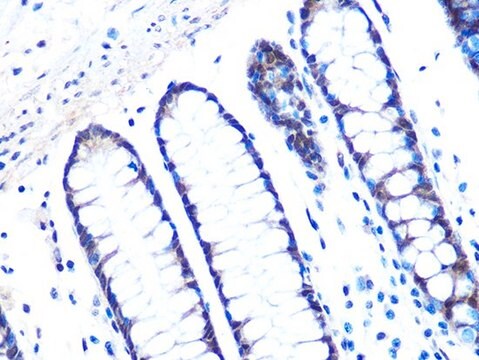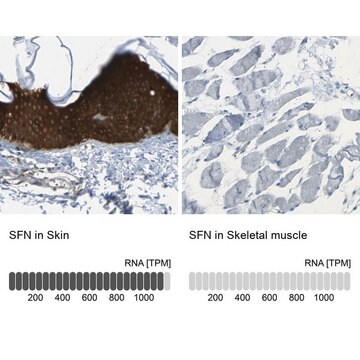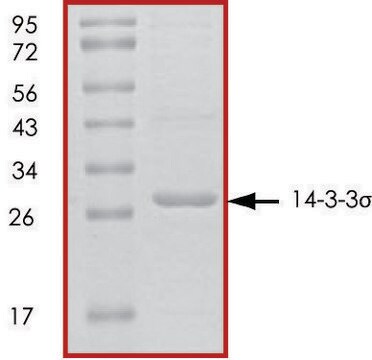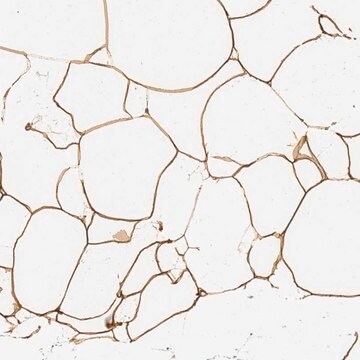推荐产品
生物源
rabbit
品質等級
抗體表格
affinity purified immunoglobulin
抗體產品種類
primary antibodies
等級
Powered by Bethyl Laboratories, Inc.
物種活性
human
技術
immunohistochemistry: 1:2,000-1:10,000
immunoprecipitation (IP): 2-5 μg/mg
western blot: 1:2,000- 1:10,000
登錄號
NP_006133.1
運輸包裝
wet ice
儲存溫度
2-8°C
目標翻譯後修改
unmodified
基因資訊
human ... SFN(2810)
一般說明
Rabbit anti-14-3-3 Sigma or stratifin is mapped to human chromosome 1p36.11. 14-3-3σ protein is expressed as seven isoforms and has molecular weight in the range of 25 to 30 kDa. It is an acidic homodimeric protein and harbors pleckstrin homology (PH) domain. 14-3-3σ is highly expressed in epidermis.
免疫原
The epitope recognized by PLA0201 maps to a region between residue 198 and 248 of human 14-3-3 sigma using the numbering given in entry NP_006133.1 (GeneID 2810).
應用
Rabbit anti-14-3-3 Sigma Antibody, Affinity Purified has been used in the pull down assay for Rho associated coiled-coil containing protein kinase 1 (ROCK1) proteins and heat shock 70 kDa 4 protein (Hsp74) in HCT116 cancer cells.
生化/生理作用
Rabbit anti-14-3-3 or stratifin participates in several biological events including apoptosis and cell differentiation. It regulates the transcription matrix metallopeptidases (MMPs) in fibroblasts and may serve as therapeutic potential in wound healing. 14-3-3σ is less expressed and is hyper methylated in breast cancer cells. It plays a key role in linking signalling proteins and in the enhancing of protein kinase C functionality. A mutation in the stratifin gene is implicated in epilation phenotype in mice. It interacts with ubiquitin-specific protease 8 (USP8) and is highly expressed in human lung adenocarcinoma.
外觀
Tris-citrate/phosphate buffer, pH 7 to 8 containing 0.09% Sodium Azide
其他說明
14-3-3 sigma was identified as an epithelial cell marker. It is part of the 14-3-3 family of proteins in which seven isoforms have been identified: beta, zeta, gamma, eta, epsilon, tau, and sigma. 14-3-3 proteins function as adaptors that bind with a number of partners to mediate various signaling pathways. 14-3-3 sigma is also called stratifin or HME1 and appears to function as a tumor suppressor whose expression can be downregulated via methylation. Loss of 14-3-3 sigma expression results in a defective G2/M phase checkpoint and appears to contribute to both epithelial and non-epithelial tumorigenesis.
免責聲明
Unless otherwise stated in our catalog or other company documentation accompanying the product(s), our products are intended for research use only and are not to be used for any other purpose, which includes but is not limited to, unauthorized commercial uses, in vitro diagnostic uses, ex vivo or in vivo therapeutic uses or any type of consumption or application to humans or animals.
未找到合适的产品?
试试我们的产品选型工具.
儲存類別代碼
12 - Non Combustible Liquids
水污染物質分類(WGK)
nwg
閃點(°F)
Not applicable
閃點(°C)
Not applicable
Stratifin regulates stabilization of receptor tyrosine kinases via interaction with ubiquitin-specific protease 8 in lung adenocarcinoma
Kim Y, et al.
Oncogene, 37(40), 5387-5387 (2018)
Type 2 diabetes promotes cell centrosome amplification via AKT-ROS-dependent signalling of ROCK1 and 14-3-3sigma
Wang P, et al.
Cellular Physiology and Biochemistry, 47(1), 356-367 (2018)
Mutation analysis of FANCD2, BRIP1/BACH1, LMO4 and SFN in familial breast cancer
Lewis AG, et al.
Breast Cancer Research, 7(6), R1005-R1005 (2005)
Hsp74/14-3-3sigma Complex Mediates Centrosome Amplification by High Glucose, Insulin, and Palmitic Acid
Lu YC, et al.
Proteomics, 1800197-1800197 (2019)
Stratifin, a keratinocyte specific 14-3-3 protein, harbors a pleckstrin homology (PH) domain and enhances protein kinase C activity
Dellambra E, et al.
Journal of Cell Science, 108(11), 3569-3579 (1995)
我们的科学家团队拥有各种研究领域经验,包括生命科学、材料科学、化学合成、色谱、分析及许多其他领域.
联系技术服务部门








